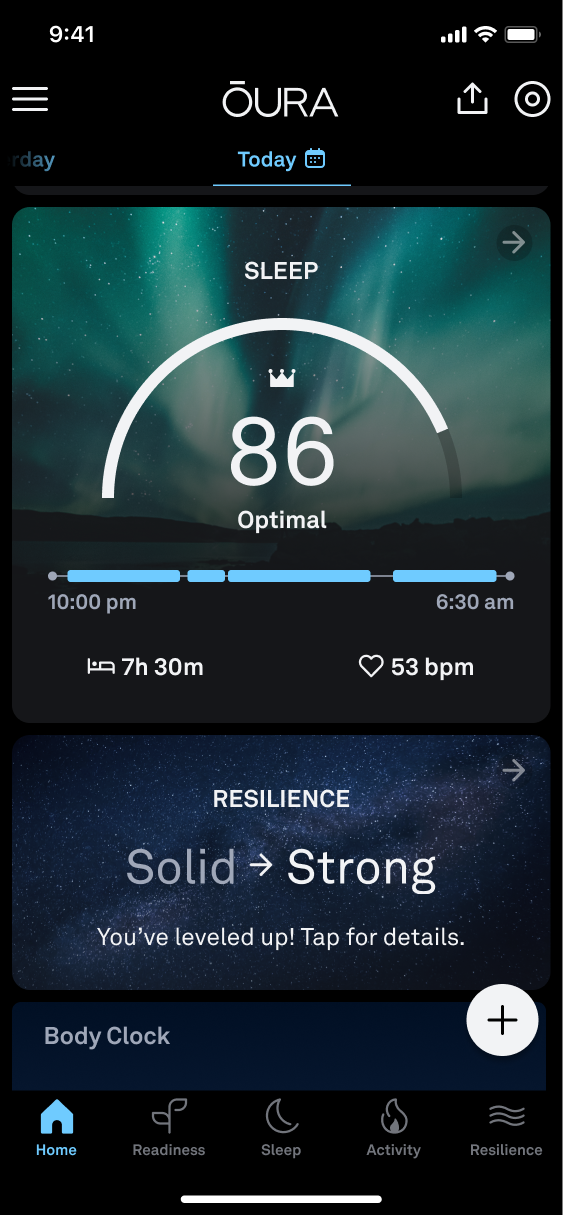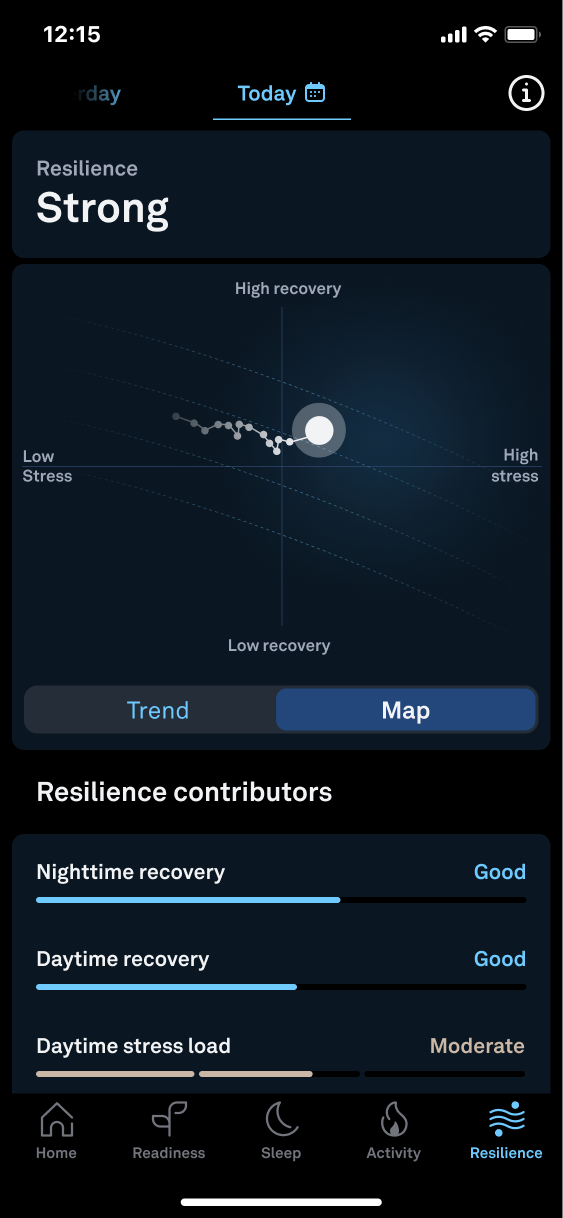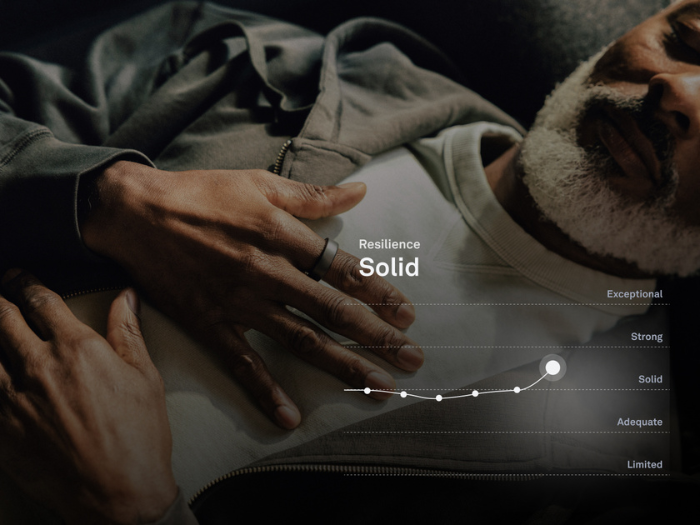- Resilience refers to your body’s ability to withstand physiological stress and recover from it in the long term.
- Oura’s new Resilience feature allows members to track their daily stress and recovery, and monitor how this balance influences their resilience to stress over time – known on Oura as their Resilience level.
- You can build resilience through habits such as exercising consistently, eating a healthy diet, experiencing hormetic stressors, getting good sleep, and surrounding yourself with social support, among others.
Everyone experiences stress in their life. Stress can stem from issues like work deadlines or family conflicts, but also from beneficial types of stress, such as a cold shower or a high-intensity workout.
No matter the specifics, it’s important to know how well you recover and “bounce back” from these taxing moments. This is known as resilience, or your body’s ability to withstand physiological stress and recover from it in the long term.
Now, with Oura’s new Resilience feature, members can learn how resilient they are to life’s stressors. Oura determines your resilience to stress by looking at how well you’re balancing physiological stress and recovery in recent weeks using Oura’s measurements of your daytime stress levels, daily restorative time, and how well you recover during sleep.
What Is Resilience?
 Resilience refers to your body’s ability to adapt to stress. As you likely know, it’s impossible to live a completely stress-free life — and you wouldn’t want to! Stress can be beneficial, and even necessary, to your health. Plus, studies show that stress exposure is required for building resilience.
Resilience refers to your body’s ability to adapt to stress. As you likely know, it’s impossible to live a completely stress-free life — and you wouldn’t want to! Stress can be beneficial, and even necessary, to your health. Plus, studies show that stress exposure is required for building resilience.
People with low levels of resilience may experience detrimental effects on their physical and mental health. Studies show that low levels of resilience can lead to ailments such as burnout, anxiety, fatigue, a higher resting heart rate, and lower heart rate variability (HRV).
The good news: Resilience isn’t fixed; it’s something you can build and improve. While research suggests your natural inclination toward resilience depends on a variety of biological, social, and environmental factors, you can develop strategies to increase it. (More on that below.)
Resilient people still experience stress, but they possess the mindset, tools, and strategies to recover effectively and return back to equilibrium — sometimes even stronger than before.
| Member Tip: Oura categorizes your resilience levels over the past two weeks, ranging from “Exceptional” to “Limited.” A positive trend means you’re recovering well and strengthening your resilience, while a downward trend may signal the need for intentional recovery. |
RELATED: Reframing Stress: The Difference Between “Bad” and “Good” Stress
Benefits of Resilience
Research has linked high levels of resilience to various health benefits. Resilient individuals report greater life satisfaction, tend to be more optimistic, have better social skills, and even sleep better. Resilience is also associated with:
- Lower levels of anxiety and depression
- Improved immune function
- Higher HRV — a metric that reveals your body’s adaptability and recovery from stress
- Better brain health
- Lower risk of cardiovascular and metabolic issues
How Oura Measures Resilience

For the Resilience feature, Oura’s algorithm “evaluates your ability to manage stress and enhance overall well-being by integrating two key components: physiological stress and recovery,” says Iman Alikhani, Senior Data Scientist at Oura. In the Oura App, your resilience is categorized into 5 levels: Exceptional, Strong, Solid, Adequate, and Limited.
The first aspect of resilience, physiological stress, is assessed by tracking the intensity and frequency of daytime stress observations from the Daytime Stress feature. The second component, recovery, encompasses both daytime recovery and recovery during sleep.
Together, these pillars form the foundation of Oura’s Resilience feature, creating a holistic assessment of your ability to withstand physiological stress, as well as your balance between daytime stress and recovery, Alikhani says.
READ MORE: Inside the Ring: Developing Oura’s Resilience Feature
How to Build Resilience
Building resilience begins with managing stress. “At Oura, we define resilience as ‘stress-recovery balance,’” explains Mari Karsikas, PhD, Head of Product Science at Oura. “When considering how to build resilience, an emphasis needs to be put on managing stress.”
While toning down the stress in your life might sound like a Herculean task, it doesn’t require an entire life overhaul. In fact, many strategies for building resilience are actually pretty simple, like eating nutritious food, getting enough sleep, and relying on your support system.
Read on for seven research-backed ways to build resilience and manage stress.
1. Eat a healthy diet.
Research suggests that the foods you eat play an important role in promoting resilience. Studies have found that a vitamin-deficient diet correlates with low resilience. According to a 2022 study, seafood, whole grains, healthy fats, and fruit are all key components of a resilience-boosting diet.
Be sure to focus on foods that support your gut, too: Research shows that a healthy microbiome and low inflammation levels play an important role in your immunity and therefore, your resilience. Include fiber-rich foods that support gut health, like whole grains, veggies, and legumes, as well as prebiotics and probiotics, in your diet.
RELATED: 5 Bedtime Snack Recipes for Better Sleep
2. Fine-tune your sleep.
A bidirectional relationship exists between sleep and resilience: Resilient individuals tend to sleep better, while good sleep can bolster resilience.
Maintaining a consistent sleep schedule aligned with your body’s circadian rhythm and getting between 7 to 9 hours of sleep per night is the first step.
| Member Tip: In the Oura App, tag your habits and any daily factors that may be impacting your sleep, like blue light, caffeine, or noise. Use the long-term Trends view to see how these habits are impacting your sleep over time, to pinpoint what helps — and hurts — your sleep. |
READ MORE: Rest & Resilience: The Role of Sleep in Stress Management
3. Embrace hormetic stressors.
Exercise, sauna, cold plunge, breathwork, and intermittent fasting are all types of hormetic stressors that build resilience. They do so by “training your body to respond to stress with an acute peak response, followed by quick recovery with restorative parasympathetic activation,” according to Elissa Epel, PhD, stress expert and Oura advisor.
“In animal studies, stressors that are repeated at moderate doses promote positive cellular adaptation and longevity,” says Epel. “We refer to this as ‘stress fitness’ – exercising your body with short bursts of stress, several times a week, to promote a healthy hormetic response.
READ MORE: Reframing Stress: The Difference Between “Bad” and “Good” Stress
4. Build your “resilience toolkit.”
“When you’re stressed, you need real-time coping mechanisms,” says Liadan Gunter, a neuroscientist, behavioral scientist, and founder of The Rewiring Lens. 
Coping mechanisms can be positive (adaptive) or negative (maladaptive) — for instance, “Deep breathing is an adaptive skill, while drinking alcohol is maladaptive,” Gunter says.
When you find positive coping mechanisms that work for you, add them to your metaphorical “toolkit.” It may include practices such as:
- Deep breathing
- Taking a nap
- Calling a friend
- Journaling
- Going for a walk
- Taking a bath
- Professional support such as talk therapy
“These tools are soothing to our nervous systems and can help bring your physiological response down to a state of calm – helping you manage stress in real time,” says Gunter.
READ MORE: 9 Simple (and Science-Backed!) Ways to Lower Stress
5. Practice gratitude.
Take a moment a few times a week to jot down a list of what you’re grateful for, big and small – the sunshine, a comfortable bed, your friends and family.
Studies show that practicing gratitude can be a step toward greater resilience and optimism. A 2022 study concluded that gratitude is associated with less pessimism, anxiety, and depression, and more optimism, happiness, life satisfaction, and resilience.
“Practicing gratitude is associated with positive hormonal and neural benefits,” says Gunter. “It can lead to lower levels of cortisol, offer a dopamine and serotonin release, and even increase the neural sensitivity of the prefrontal cortex, allowing you to exert more control over your emotions and decision-making.”
READ MORE: How Journaling Can Improve Your Health — And How to Make it a Habit!
6. Lean on your social circle.
Social support can help you bounce back from stressful experiences, science shows. A 2013 study found that social support activates the brain region associated with safety, inhibiting the threat response, lowering cortisol, and releasing oxytocin.
Plus, having strong social bonds can encourage you to make healthier choices, like good sleep and healthier food, which may indirectly improve your resilience.
| Member Tip: Keep up with friends and family using Oura Circles. With this feature, you can share your high-level health data with other Oura members, which can serve as the basis for a conversation starter, a congratulatory note, or a gentle check-in. |
7. Adjust your mindset.
 Adopting a growth mindset, which refers to the optimistic belief that you’re capable of change and growth through effort and learning, is a science-backed way to build resilience.
Adopting a growth mindset, which refers to the optimistic belief that you’re capable of change and growth through effort and learning, is a science-backed way to build resilience.
It’s also wise to think outside yourself: Developing compassion and kindness for others and seeing our common humanity has been shown to be a way to build resilience.
Finally, focus on the present moment. “Studies have shown that practicing acceptance of your thoughts and feelings improves your stress reactivity profile,” says Epel. “I give people the example of being caught in a riptide: don’t fight it, swim with the current. Accept stress, and you’ll be more resilient in overcoming it.”
READ MORE: Your Mindset Matters: How to Build Resilience to Stress with a Growth Mindset
About the Oura Experts
Iman Alikhani is a Senior Data Scientist in the Product Science Team at Oura. He has a degree in Biomedical Engineering from the University of Oulu, and he has worked in the health and medical technology field for the past 5 years.
Mari Karsikas, PhD, is the Head of Product Science at Oura. She has more than 20 years of experience in research and product development based on patient and health data of hospitals and health technology companies. She has a Doctor of Technology degree focused on intelligent systems and biosignal processing. In her free time, she loves kite skiing and arctic adventures in northern Finland, where she lives.
Elissa Epel, PhD, is an Oura advisor, international expert on stress, well-being, and optimal aging, and a best-selling author of The Telomere Effect and The Stress Prescription. She is a Professor in the Department of Psychiatry & Behavioral Sciences, at The University of California, San Francisco, where she is Vice Chair of Psychology and directs the UCSF Aging Metabolism Emotions Center.
Liadan Gunter, MSc has a BA in neuroscience from Boston University and an MSc in Research in Behavior and Cognition from Universitat de Barcelona. She works as a behavioral coach for individuals and members of organizations on how to optimize and rewire their brains.











